 |
|
|
 |
2005
August
30-31
|
Falling off the horse on the other side
(A point of practical logic)
A friend writes to point out that much of the popularity of
young-earth creationism probably comes
from the fact that Christians want to
stay as far away as they can from godless
evolutionary metaphysics
(the popular, but entirely unscientific, notion that
"science has proved there is no God" and that
evolution explains everything).
So they take shelter in the other extreme, which is young-earthism,
with a determination either to ignore scientific evidence, or to
insist that it be interpreted in something other than the usual way.
The problem? The opposite of an error is usually not truth;
it is another error. As Martin Luther put it, mankind is like
a drunkard who falls off the horse on the left, and then makes up
for it by falling off the next time on the right.
Theological truth doesn't change, but scientific evidence
about the origins of life
has been piling up within our lifetimes.
Books about creationism written 75 years ago are still popular - but in those days
DNA hadn't been discovered, nor a good bit of the fossil record, nor a good bit of the
astrophysical evidence for an ancient universe.
Accordingly, we Christians do some fresh thinking about how to put all this together.
(We also need to shy away from the silly notion that all Christian doctrines
can go out the window because "times have changed."
We respond to new information but not new tastes, desires, or fashions.)
I respect recent creation as an opinion that ought to be kept in mind just in case the
weight of the evidence shifts.
But I think some young-earthers (not all!) have risen to the level of actual heresy
(deliberately unsound doctrine) as they promote their "theories" for
self-glorification and as a way to pour contempt on other people's
honest intellectual work.
Permanent link to this entry
A fallacy for the rest of us
Now let me mention a logical fallacy that is very popular with educated people,
much more so than the "falling off the horse" fallacy that I just mentioned.
That is the notion that
truth is always a compromise between opposing positions
and hence that compromises are inherently likely to be true.
People often express this by saying, "I can see shades of gray, not just
black and white," as if black and white were always necessarily false.
It would be like saying that if some people think the moon is made of green cheese,
and others think it is made of snow, then it must actually be a mixture of the two.
It would also be like saying that if some people think 2+2=4 and others
think 2+2=6, then the truth must be that 2+2=5, or that 2+2 equals
some kind of range
from 4 to 6.
You don't find truth by classifying positions as "extreme" or "moderate."
You find it by following the evidence.
Permanent link to this entry

|
 |
2005
August
29
|
The Milky Way of E. E. Barnard
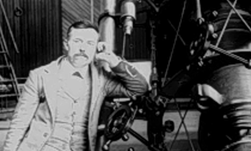 My colleagues over at Georgia Tech have made E. E. Barnard's famous
Photographic Atlas of Selected Regions of the Milky Way (1927)
available
online.
My colleagues over at Georgia Tech have made E. E. Barnard's famous
Photographic Atlas of Selected Regions of the Milky Way (1927)
available
online.
Compare yesterday's picture to the left-hand side of Barnard's
Plate 26.
For this pioneering work, done in 1905, Barnard used a custom-made
1278-mm f/5 Petzval-type lens
(ten inches in diameter!) and 12-inch-square
photographic plates.
Barnard's goal was to study dark nebulae, the clouds of obscuring dust that block our
view of distant stars. You can see one of them just to the right of the center of yesterday's
picture. It is Barnard 86 (guess who discovered it?) and seems to punch a hole in the sky,
though in reality it is a small, dense blob of dark matter.
Barnard lived the American dream, rising from poverty in Tennessee to become his generation's best
astronomical observer.
A lively short biography is here;
another,
a full-length book,
can be sampled
here.
(Note character set problems in the online file, which, as far as I recall, are not in the book;
"p Ophiuchi" is really ρ Ophiuchi, and "0 Ophiuchi" is θ Ophiuchi.)
Permanent link to this entry

|
 |
2005
August
28
|
Finally, some stars

Click for larger image
|
|
Last night was the calm before the storm (literally; Hurricane Katrina is coming)
and we finally had reasonably clear weather
(naked-eye mag. limit 4.5 in town) for the first time in weeks if not months.
At the right is a composite of 3 5-minute exposures at ISO 200 using the Digital Rebel
and my
new Sigma 105/2.8 macro lens at f/4.
This is from the upper right corner of the picture, showing the nebula M8 at the top
and some star clouds and dark nebulae below. Notice how sharp the stars are.
Another thing that impressed me about this lens was the utter lack of vingetting
at f/4.
While processing these pictures I learned that
ImagesPlus 2.10A breaks when you
install Microsoft Raw File Viewer.
The error message is "Could not initialize support for Canon raw file conversion,"
and then Images Plus crashes in an unresponsive state, requiring Task Manager to
shut it down.
The culprit is "DLL Hell,"
conflicting versions of Canon's DLL files with the same name
but different functionality.
These files are supplied by Canon for use with software that reads raw files.
Microsoft Raw File Viewer replaces some of them with newer versions.
Then Windows can't tell them apart, and loads the wrong ones.
This is the single worst design feature of Windows versions prior to .NET Framework.
It was designed to save disk space back in the 1990s, but most of us would much
rather have reliability than disk space.
I am not sure if there are Windows settings or other tricks that can work around the
problem.
I thought Windows XP would always prefer the DLLs that were in the same folder as
the application program (.EXE file)... I'm going to look into this.
But I'm also going to switch to a later version of Images Plus; I understand there
are improvements to the user interface, which started out highly nonstandard.
|
Permanent link to this entry

|
 |
2005
August
27
|
Miscellany
Mars hoax: Mars won't be doing anything special today, despite what you may have heard.
Details here.
Scamming the scammers:
The BBC reports
this
very amusing story of a man who scammed one of the Nigerian spammers
into sending him money.
Caution: Be very careful and never give these people any true information
that would enable them to find you. They are organized criminals and are not your friends.
Death of film: 35-mm film cameras are
no longer sold
at Dixon's, the main British camera store chain.
I got a good look at a
Canon EOS 20D
today and was pleased to see that it has a bigger
viewfinder image than the Digital Rebel. Not big enough, but bigger.
Camera makers made a strategic blunder when they built DSLRs with sensors smaller
than 35-mm film. They didn't increase the viewfinder magnification to compensate.
(That is partly because they quote viewfinder magnification as if you were using
a 50-mm lens, which is no longer the normal lens.)
As a result, using a DSLR is often like looking through a small window.
Recommended one-panel daily comics:
Moderately Confused
and
Speed Bump.
Read them on line, of course.
Permanent link to this entry

|
 |
2005
August
26
|
A hidden secret of the Nikon D70 and D70s
At last, a real opportunity to test the Nikon D70s that Nikon USA has kindly lent me.
I wanted to track down the star-eating phenomenon
reported by noted French astrophotographer
Christian Buil.
"Star eating" is my own name for it.
The idea is that the Nikon D70 and D70s have a very aggressive speckle-removal algorithm,
which unfortunately mistakes tiny star images for noise, and removes them.
It's true, but you can prevent it.
Here are three pictures of the field of Altair,
plus a chart made with TheSky to help you distinguish stars from noise specks:
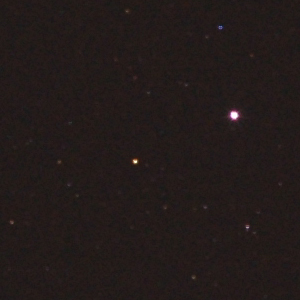
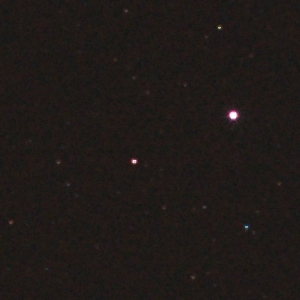
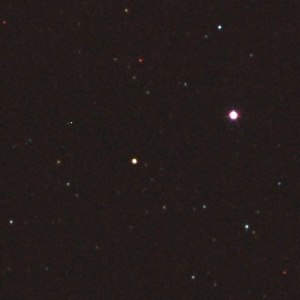

Each of the photos is the central 300×300 pixels of a 30-second ISO 400 exposure
with a 50-mm lens at f/4.
You're viewing them highly magnified - the whole picture, at this scale, would be about two feet wide.
In the first, dark frame subtraction ("noise reduction") is off;
in the second, it is on;
and in the third, it is on but interrupted.
That is, I switched off the camera while it was taking the dark frame.
This forced it to retain the "truly raw" temporary image that it had stored at the end
of the main exposure - and in that temporary image, the stars and speckles
have not been eaten.
That's why the third picture shows more stars, but also more noise (such as the reddish "hot pixel"
at the bottom right).
These were captured as JPEGs, but the same effect was observed with raw (NEF) files.
So - to defeat the star eater - turn noise reduction on, and then turn the camera off while it's taking
the dark frame after the main exposure.
Naturally, you'll have to take a dark frame of your own (the same way) and do the subtraction on your PC when
you process the pictures.
Incidentally, the magnitude limit was 8.5 with an aperture of 1.25 cm (50 mm / 4), a 30-second exposure,
and a sky with about 2 magnitudes of obscuration due to haze. That leads me to predict that with my
best 300-mm lens (75 mm clear aperture), a 5-minute exposure, and a good sky, I'll
gain 2.5 log (75/12.5)2 + 2.5 + 2 = 8.4 magnitudes,
for a limit of 17. Is that possible?
Permanent link to this entry

|
 |
2005
August
25
|
Gasoline prices
If you look at
Doug Downing's inflation-adjusted chart,
you'll see that gas prices are actually about what they were in 1979 -
high, but not unprecedently high.
Here I am with a 5-mile commute, and all the family vehicles get at
least 20 miles per gallon.
Around me, would-be Atlantans are commuting 50 or 75 miles each way, in SUVs.
Georgia needs railways!
Actually, my biggest reason for not commuting a long way by car is safety.
Driving or riding in cars is the most dangerous thing most of us do.
If you're taking reasonable care of your health, avoiding long stints in the car
is, I'm told, the best way to increase your life expectancy.
Permanent link to this entry

|
 |
2005
August
24
|
Notes from all over
New web site: We've given our Dictionary of Computer and Internet Terms
its own web address, termbook.com. Enjoy!
Obscure song found: One of the songs that I associate strongly with the year 1974
(thanks to a somewhat eccentric local radio station that played it a lot) is Al Martino's
"To the Door of the Sun" ("Alle Porte del Sole"),
which is partly in Italian.
Recently Melody bought the audio file for me and I heard the song for the first time in three
decades.
More importantly, thanks to the Internet, I've
traced it to its source.
As I more than half suspected, the same song came out concurrently in Italy,
performed by
Gigliola Cinquetti
(audio sample
here).
I also found the
lyrics on line and was pleased to disentangle some parts I'd had trouble hearing.
When I thought they were saying Io porta' t' insieme me, which sounds ungrammatical,
it was really Ti ho portat' insiem' a me ("I have carried you with me"). Much better.
Now if I could just stop the tune from running around in my head...
To my pleasant surprise, my entry about young-earthism 2 days ago hasn't provoked any outpourings of
wrath (human or divine). Maybe young-earthers don't read blogs.
Permanent link to this entry

|
 |
2005
August
23
|
Moon picture
It's been too long since I posted a picture.
This is what I got on August 15 by holding the Nikon D70s (with 50/1.8 lens) up to
the eyepiece of my telescope (Celestron 5 with 32-mm eyepiece),
then postprocessing with Photoshop.
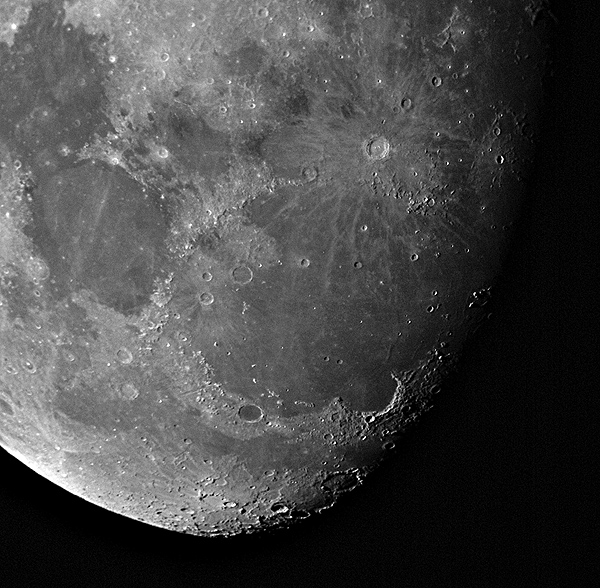
In memoriam: Today would be the 80th birthday of my mother,
Hazel Roberts Covington, 1925-1985, who, after the death of my
father in 1966, worked extremely hard to raise and educate my sister and me,
and who, sadly, didn't live long enough to see any of my books published.
Intelligent design: I should add that yesterday's entry has
essentially nothing to do with the intelligent design (ID) controversy,
i.e., the claim that, in studying the structure and
development of the universe and especially of life, we can find
statistical evidence
of an intelligent designer.
I am not competent to judge the claimed evidence; I note only
that the very concept of evidence - and how to judge it - is in dispute.
Permanent link to this entry

|
 |
2005
August
22
|
4004 B.C. and all that
See also August 30.
[Edited for clarity and conciseness 9 p.m. Aug. 22.]
I am a Christian but not a young-earth creationist.
As far as I can tell, young-earthism isn't part of historic Christianity
(St. Augustine, for instance, wasn't a young-earther),
nor is it a clear Biblical teaching, so I see no need to defend it.
I think it's important to make it clear that
most scientifically literate Christians are not young-earthers.
Young-earthism seems to have emerged from 19th-century American frontier
Christianity around the same time as Seventh-Day Adventism, and my
understanding is that the two are related.
It's true that if you add up some dates in the Bible, you get a minimum
age of the earth of about 6000 years.
And it's true that if you have no other evidence of the age of the
earth, you might find this estimate reasonable. Many people did in the past.
But it seems fairly obvious to me that the Bible does not actually try to tell
us the age of the earth, nor are the first few chapters of Genesis expressed scientifically.
They say who and why, not how.
One phrase sounds almost Darwinist ("Let the earth bring forth living
creatures...").
Young-earthism usually means young-universe-ism, and young-earthers face
serious problems dealing with the fact that the universe is very large,
and therefore, given the speed of light, very old.
A noted young-earther, Ken Ham, is in town and although I haven't been to his
talks, I did go to his web site
to see what he had to say.
He acknowledges the age-of-the-universe problem and rejects the obvious solution
(that God created the light of distant stars in transit to us).
He points out, rightly, that we see not just distant objects but distant events,
and this would imply God is making us see things that never happened.
Instead he offers a cosmology in which the very nature of time is allowed
to shift. Details here.
I'm not enough of a physicist to understand it, and I'm not sure it's explicit enough
(on the page I cited) to be understood.
But I want to reply with one point of logic.
If you're going to redefine time, why stick with 6,000 years?
Haven't you just made your own principal claim meaningless?
As my friend Dan Orme
pointed out many years ago, one of the characteristics of heresy
(deliberate distortion, as opposed to honest error)
is undue emphasis on precisely the points that are erroneous.
And that's what makes me sad about young-earthism.
It would be one thing to offer young-earthism as a possibility that should be kept
in mind just in case.
Some future discovery might conceivably shift the weight of the evidence.
But all too many young-earthers are convinced that young-earthism is an absolutely
indispensable part of the Gospel.
At best, they're mixing up two ideas.
No Christian can accept evolutionism as a complete godless explanation of life and the
universe. But that doesn't mean we have to be young-earthers.
There's plenty of ground for admitting that we've learned a lot, in modern times,
about how God did it. Or even that we don't know everything and are
eager for discoveries to continue!
At worst, they've simply latched onto a pet idea which they are putting ahead of Christ Himself.
In that case, I recall that Our Lord said something rather alarming about
millstones.
Let me say this plainly.
Young-earth sophistry is divisive and an obstacle to evangelism.
We need to be saying very loudly that
Christians are allowed to follow the scientific evidence where it leads.
Permanent link to this entry

|
 |
2005
August
21
|
More megapixels aren't necessarily better
(Pixel size matters too)
John Dvorak's column in PC, June 28, points out something I've always
known with regard to astronomical imaging, but most digital photographers
haven't thought about...
It's not just how many pixels you have.
It's how big they are.
That's why DSLRs tend to be better than compact digital cameras with the
same number of megapixels.
A bigger pixel - that is, a bigger cell on the image sensor - covers a wider
brightness range and has less noise.
The most popular DSLRs - Canon Digital Rebel and Nikon D70 - have sensors
about 2/3 the size of a 35-mm film frame.
(That is, they have a "35-mm equivalent" of 3/2 or 1.5; every lens
gives 1.5x more magnification with film.
The manufacturer has to tell you the sensor size so you'll know how your lenses
will perform.)
And 2/3 of a film frame is 16×24 mm.
The 6 megapixels are arranged in a 2000×3000 array.
That means each pixel is 16/2000 = 0.008 mm = 8 microns square.
Nice and big.
Compare this to the Kodak EasyShare Z760, a fine pocket-size digital camera,
also 6 megapixels.
Its sensor is "1/1.8-inch," which is a type of measurement that used to apply
to television cameras; it works out to 8.8×6.6 mm.
The pixels are only 3 microns square.
That's less than a quarter as much silicon per pixel.
The moral? Smaller sensors are cheap and handy, and it's easier to make versatile
lenses for them, but when you have less silicon, you have more noise
(because there's less opportunity for signals to average out)
and less dynamic range (because each cell holds fewer electrons).
A second moral? A 24-megapixel DSLR with the same size sensor as a 6-megapixel one
may or may not take better pictures.
It surely will, but not four times better.
Yet another issue to consider is the beneficent practice of allowing
adjacent pixels to influence each other.
The picture has as many pixels as the sensor, but they aren't exactly the same
pixels, for three reasons.
First, adjacent pixels are sensitive to different colors in a pattern known as
the Bayer matrix.
Each pixel knows its own brightness, but in order to fully determine its color,
it must look at two of its neighbors.
Second, if each pixel stood by itself, striped objects, such as distant zebras,
would form moiré patterns with the pixel matrix.
To prevent this, all good digital cameras use antialiasing, the controlled
mixing of each pixel with its neighbors.
This may scare you - are they blurring my precious picture? - but believe me,
it is a good thing.
Antialiasing is the key to avoiding the "computer look" and producing "photo-quality" output.
And third, good cameras do their own noise reduction, and part of this involves looking
for pixels that are seriously out of line with their neighbors.
Impossibly tiny specks must be electrical noise, so a sufficiently smart camera removes them.
This particular feature leads to the notorious Nikon star-eating problem, which I have
yet to fully test.
Reportedly, if you use a sharp Nikon lens on a Nikon D70 body, and photograph a star field
in perfect focus, the star images are so tiny that the camera mistakes the fainter stars for noise
and eliminates them.
The trick to prevent this is to turn dark frame subtraction (noise reduction) on, but
switch the camera off while the dark frame is being taken.
At that point a "truly raw" image has already been recorded on the memory card, and you
don't want the camera to overwrite it with an image from which speckles have been removed.
More on Nikon star-eating soon, when we have some clear weather and I can perform tests.
Permanent link to this entry

|
 |
2005
August
20
|
Do-not-call loophole
The national do-not-call list does not apply to most calls to businesses.
So if you've ever run any kind of business out of your home, and you've ever given out
the home phone number as that of the business, you may find that it's open season on you.
We've recently had two unsolicited calls from a company promoting - guess what? -
advertising by mail.
This brings up a cultural phenomenon I've been thinking about:
separation of home and business.
The mid-20th-century notion of elegant living included the
relatively newfangled
assumption that your home should contain
absolutely no sign of how you earn your living.
I think this is largely a marketing thing - when selling houses or decorations,
you don't want to tie them to people in a particular profession - and partly
a tendency to equate elegance with being independently wealthy.
But it also meshes
with the post-Industrial-Revolution notion that you
work at the factory and live in your house and the two
activities are totally separate.
This separation doesn't suit the post-computer-revolution crowd very well.
Today, working at home is very common.
Creative and enterprising people don't go to the factory and punch a time clock.
Or if they do, that's not the whole of their productivity.
Three hundred years ago, it was common to live and work at more or less the same place.
For farmers, it always has been.
I wonder how many calls farmers get from telemarketers.
Permanent link to this entry
The theory behind cursive handwriting
Like
Jeff Duntemann
(item archived here),
I gave up on cursive writing when I got out of high school.
More of the story is on my
pen page.
Cursive writing has existed in one form or another since the Middle Ages.
One language (Arabic) uses cursive and nothing else. Some others (Japanese, Chinese) don't have cursive.
Hebrew has something called cursive, but it isn't continuous - it's simplified printing.
Why is there such a thing? Not for legibility. Cursive is harder to read than printing.
It was a real burden on children a century ago, when they were taught to read print but write
cursive; they couldn't reproduce what they saw in books. "Manuscript" printing in elementary school
didn't come in until mid-century.
One reason for cursive is that some pens don't work well if they're lifted off the
paper. The idea is to keep the pen down and keep the ink flowing.
But another reason - which Jeff has just dredged up, although I had a vague inkling of it -
is that cursive writing isn't supposed to be as tiring as writing any other way.
This theory was promoted by a gentleman named
Palmer about a century ago.
The idea was that you should write with motions of the arm and shoulder, not the fingers.
Palmer's cursive strikes me as particularly easy on the muscles, and also particularly prone
to illegibility. Too much of the distinctive shape of each letter has been rounded off.
It was, perhaps, a healthy reaction against the overly ornamental script of the mid-1800s.
But no matter how much the Palmer Method may have lightened the load on people's hand muscles,
ballpoint pens did the opposite.
There's no quicker way to get your hand tired than to write with a ballpoint pen,
especially a bad one, where you have to press so hard that you might as well be carving whalebone.
Permanent link to this entry

|
 |
2005
August
19
|
Olds battery adventure documented
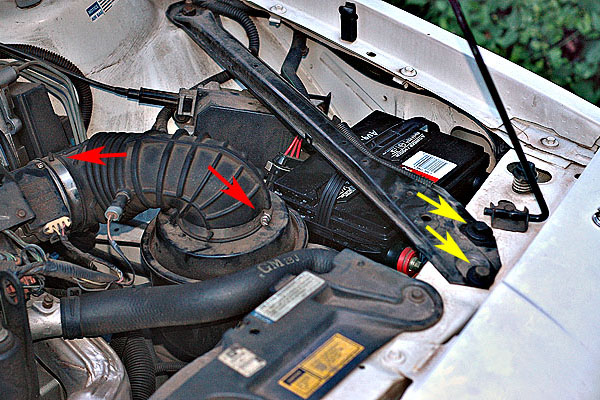
Further to yesterday's entry, here is exactly what we went through to replace
the battery in my 1995 Oldsmobile Cutlass Ciera SL.
(1) Loosen two hose clamps (red arrows) and remove the large hose that they are part of.
(This is the engine's air intake. I know it doesn't have much to do with the battery,
but bear with me.)
(2) Remove the air cleaner lid and the air filter.
(3) Remove 2 screws (yellow arrows) and move the large brace to the left, over the air
cleaner, out of the way. The screw at the other end of the brace may need loosening.
(4) Disconnect the battery (using an insulated battery terminal wrench,
since there's so much metal near it) and cover the positive terminal with tape
or the plastic cap from the new battery.
(5) Remove the battery hold-down (at the base of the battery, in front).
(6) Remove the battery. This is still not easy; it's a 3-dimensional
jigsaw puzzle which Melody solved. The solution involves flexing the
air cleaner slightly, which is why you took the filter out of it.
(7) Replace the battery and reassemble everything.
If the battery were a quarter inch narrower, the air cleaner shenanigans wouldn't be necessary.
Half an inch, and they certainly wouldn't be.
The picture was taken with a Nikon D70s and 50/1.8 Nikon AF lens, with ambient light
and fill flash, and then processed repeatedly with unsharp masking in Photoshop.
By unsharp masking at several different radii (some of them as large as 60 pixels), I make it look
as if everything were illuminated to make it stand out from the background.
Permanent link to this entry
Brother Roger of Taizé
A very important 20th-century religious leader was
assassinated
on Tuesday, and the news media have barely reported it.
The 90-year-old founder of the
Taizé Community
was stabbed to death during a prayer service.
Taizé is essentially a Protestant contemplative and monastic movement.
It has created its own kind of music which somewhat resembles Gregorian chant.
Worship services in Taizé style are held all over the world.
Permanent link to this entry

|
 |
2005
August
18
|
Olds Ciera battery replacement:
Off by about 6 mm
Rather unexpectedly, after it refused to start in a parking lot this
afternoon, Melody and I spent the evening replacing the battery in my
trusty old 1995 Oldsmobile Cutlass Ciera.
This is not as easy as it ought to be.
You have to move a steel brace aside, but before that,
you also have to remove the air intake hose, the air cleaner lid,
and the air cleaner filter.
To get a battery in or out, you have to flex the side
of what's left of the air cleaner, which is plastic.
I gather someone needed about 6 mm more space for the battery
than is actually available.
Or was the original battery narrower than the ones we're using now?
Kudos to Melody for actually figuring all of this out.
I'm glad I married the daughter of an auto parts dealer!
A song that would be better off without the words
Melody surprised me yesterday by buying some music files and burning them to an audio CD.
Among them is
Sally Harmon's
nice instrumental performance of the Beatles' "Norwegian Wood."
(Sample it
here if
you have RealPlayer.)
In my youth I had the good fortune to encounter
that song as an instrumental before I heard the words.
I think it's better off without the words, which are admittedly comical.
The tune itself is haunting and deep; it stretches the bounds of Western music
in an interesting direction (Indian?).
I once made a note that it seems to be taken from a passage
in Débussy's Pelléas et Mélisande,
but I don't have a recording of that work handy, so I can't check.
When I hear it,
I prefer to think about something more sublime than a failed one-night stand.
Shrinking blog: For the sake of your reading pleasure and my disk space, I'm
trimming down some of the past (archived) entries in this notebook,
cutting out repetitions, comments on bygone current events, and the like.
If I do it skilfully, you won't miss what's gone.
Permanent link to this entry

|
 |
2005
August
16-17
|
An echo, not a voice
Some of the letters to the editor that you see in newspapers are not
the voices of individuals.
They are pre-written by organized groups, which then persuade
individuals all over the country to send them in, with or without minor
changes.
Thanks to Google, this situation is easier to detect than it used to be.
I invite you to Google for the phrase
"America needs a bold new energy strategy, but the president and Congress have punted,"
both
on web pages
and
in newspapers.
(Just click on the two links I gave you.)
Eric Crawford, of Athens, Ga., called my attention to this.
He wrote a letter to the Banner-Herald
pointing out that an earlier letter was one of this set.
Maybe we do need a new energy policy.
Three hundred letters that say the same thing can't be wrong - can they?
Permanent link to this entry

|
 |
2005
August
14-15
|
Good work, lots of it...
The reason this Notebook has been so dull lately is that I've been busy writing up
major research results which we do not yet have permission to disclose.
Suffice it to say that
CASPR
is no longer just laying groundwork - it's getting results.
We've discovered a major new type of language impairment and a way to test for it by computer.
Meanwhile, the AI Center is busy; we're orienting new students; and
classes start Thursday.
And the oddest thing I've heard of recently is
this.
At least it tells us something about how a certain
kind of activists see themselves.
Speaking of controversies,
the publisher of Grand Theft Auto: San Andreas is getting a lot
of
well-deserved flak
about the pornography hidden in the video game.
But doesn't anybody feel that realistic theft, murder, and
gang warfare are morally degrading too?
Permanent link to this entry

|
 |
2005
August
13
|
Stupid bank tricks
Until recently, I thought the financial news was deadly dull.
But I've come to realize that it contains at least as much
human comedy as any other kind of news.
Today I've stumbled on the
OCC's news releases,
a remarkable collection of what David Letterman
would doubtless call Stupid Bank Tricks.
Consider for example the
Bank of Marin incident
in May 2004:
The bank offered secured credit cards to individuals with impaired credit histories,
and encouraged them to charge the $200 security deposit to the card.
After adding various fees that were also charged to the card, customers who received the bank’s minimum credit line of $260 had only $2.50 in credit available for their use. In its solicitations, the bank promoted the ability to charge the security deposit to the card as a benefit to customers.
The bank had to give the money back.
But you must admire their twisted logic.
They issued secured credit cards
(the kind where you prepay some cash so you won't actually owe money)
and then charged the security deposit to the card itself.
Sort of like lengthening a belt
by cutting a piece off one end and sewing it on the other.
And just this week the OCC warned Texans about
a fake bank.
That's right - Destiny Capital Mortgage Bank isn't a bank.
And if you think the Bush Administration doesn't regulate banks,
read about the
$300,000,000 payout from Providian
in 2000.
Permanent link to this entry

|
 |
2005
August
12
|
Evolution or what?
A gleaning from this morning's online discussion in our Christian Faculty Forum...
When a scientist says, "I believe in evolution,"
and a Christian says, "I don't believe in evolution,"
they're often talking past each other.
They don't mean the same thing by "evolution."
To the scientist, "evolution" probably means a narrowly delimited theory
about heredity, natural selection, mutation, and the genetic relationships
between life forms past and present. The evidence for this theory seems
overwhelmingly strong, although, like any living scientific theory,
it is subject to refinement and revision. Attached to it are more
speculative theories about the chemical origin of life, the sudden
changes in the great apes that gave rise to mankind, and so forth.
To the religious person, "evolution" probably means a totally atheistic
worldview that claims to have complete physical explanations for the
origin of life, the universe, and everything, and a disproof of the
existence of God. Naturally, religious people can't stomach that.
Obviously, these aren't the same.
The picture is clouded by the fact that the second theory is what some people
wish science would prove, and in their optimism, they call it science
already.
But it isn't.
Permanent link to this entry

|
 |
2005
August
11
|
Latest wild Macintosh gossip
You know already that Apple is planning a Macintosh with an Intel CPU.
Well, if
this
is what it looks like,
the developers' preview edition of its version of MacOS will actually boot on a Pentium PC.
We were expecting a Mac Intel motherboard to be utterly different from a PC. Not so.
It may still be rather picky about peripherals...
...but does this mean that the Mac as a hardware platform is dead?
The OS is what the Mac was all about, all along, and one could argue that
the only reason the Mac was a computer is that the PCs of the time
were so manifestly unsuitable for any kind of expandable graphics system.
Permanent link to this entry
When money isn't visible
Cathy brought up something
interesting over dinner tonight.
As credit and debit cards replace cash,
money is becoming invisible,
just a number in a bank, not a set of tokens you actually carry around with you.
And this means a lot of younger people are going to have serious trouble
knowing how much money they have.
If you carry cash around, then your money is immediately visible, as money.
A thousand dollars look like a lot more than ten dollars.
Negative amounts aren't possible.
If you use a debit card, then all of a sudden
you have to deal with mathematical abstractions.
And there are plenty of people - some of them even moderately well educated -
who have no intuitive grasp of numbers.
For them, as Cathy puts it, the debit card doesn't hold a quantity that can be appreciated.
It just works or doesn't work.
Either there's magic in it, or the magic is depleted.
I'm concerned.
We already know that an amazing number of young adults don't keep track of their
bank balances or credit card balances.
They call the bank whenever they want to know where they stand.
(They haven't lived through bank errors, as I have. They're too trusting.)
We may have a generation that really lives like migrant workers enslaved
to the company store - they don't manage money; they just earn and spend it,
with the two activities not synchronized.
Already, some counselors teach
the envelope system
to people who can't manage money any other way:
Cash your paycheck, divide the cash up into envelopes,
and pay each expense out of the appropriate envelope.
This sounds primitive, but it reportedly works for people to whom
written numbers don't mean anything.
In a cashless society, where will they be?
Permanent link to this entry
How to whip a bank into shape
Speaking of bank errors, if you have a dispute with a nationally chartered bank
(any "national bank" or "N.A."), you can take it to the
Office
of the Comptroller of the Currency (OCC),
which acts as a powerful consumer advocate.
I believe very firmly that if a bank behaves suspiciously, you should
contact authorities.
Once, long ago, in California, I was the victim of some very bizarre bank arithmetic - briefly turning a $1400
deposit into a $5600 hold - and was very suspicious because the staff of the local
branch didn't seem to see anything wrong with it. Why were they so unaware of how a
bank normally operates? Why was somebody keeping them in the dark?
Well... I got it resolved by a bank executive and didn't go to the feds.
And as it turns out, I may have missed the opportunity to make history.
I had apparently bumped into the
tip
of the American Savings iceberg
and am haunted by the thought that if I'd contacted the authorities,
the whole problem might have been discovered and solved earlier and more cheaply.
Permanent link to this entry

|
 |
2005
August
10
|
Supreme Court nominee
Apparently, the biggest thing wrong with Judge Roberts is that he
doesn't represent any special-interest group.
He's not the token black or the token woman or the token Hispanic.
He's just an American.
He's not even much of a politician.
He is a Christian - Catholic, to be specific - and is taking some
flak for it.
Stephen Bainbridge
points out
that the judge's critics are missing the point.
Precisely because he's a Christian conservative,
Judge Roberts
will not alter the law to implement Christian conservatism.
He'll do honestly the job that's given to him.
Justice Scalia is quite explicit about that, and there's every
indication Roberts thinks the same way.
The trouble with left-wing activists is that
they often think conservatives are a rival group of left-wing activists.
That's a mistake.
Conservatives aren't just kicking toward a different goal,
they're playing by a different set of rules, one that
apparently places a higher value on being fair to
those with whom one disagrees.
(I hasten to add that I do not equate conservatism with the right wing,
nor the Republican Party, nor Christianity.)
Permanent link to this entry
Stealing your neighbor's Internet
How could this even be controversial?
Today
CNN says
you should "use caution" if you're stealing Internet access by connecting to your neighbor's wireless network
without permission.
Sure. And "use caution" when you try the doors on strangers' houses to see if they're locked.
There may be technical questions about the law, but it is obviously wrong to use someone
else's computer network without permission.
And no, you cannot assume that it's open to the public if you can get in
without a password.
The question is whether the neighbor intended to open it up to the public.
Prima facie, no, because his DSL or cable contract almost certainly forbids him
from doing so.
The bottom line, though, is that all wireless networks need passwords.
The hardware should not work, right out of the box, until you set a password.
The password need not be uncrackable.
Its purpose is not to make intrusion impossible, but rather
to distinguish authorized from unauthorized people, just like the
key to the lock on a door.
Yes, you can pick the lock.
But anyone caught picking the lock is obviously up to no good;
he knows he's not welcome.
Permanent link to this entry

|
 |
2005
August
8-9
|
Nagasaki +60
I'm so busy with research that one notebook entry will have to serve for two days,
but here it is. [Minor updates 5:30 p.m. August 8.]
August 9th is the 60th anniversary of the bombing of Nagasaki.
From the perspective of the post-1945 world, we recognize that the atom bombs dropped
on Japan were a terrible tragedy.
And I do not want to minimize this tragedy in any way.
Innocent people died by the thousands.
But as Jeff Duntemann points out,
without the bombs, we wouldn't have our post-1945 perspective.
[Jeff's article will later be archived
here.]
Paradoxically, it was atom bombs that turned the civilized world against war.
Before 1945, "peace" generally meant appeasement of a specific enemy's political goals.
Not any more.
And although the cost was terrible, the atom bombs of 1945 did end the war
- and no war like it has broken out since.
As Jeff points out, World War II was the third in a series.
There had been World War I and the Franco-Prussian War (1870).
In each, a major world power (Germany)
had fought another major world power (France).
The cycle of destruction had escalated until, in WWII, it involved
genocide with millions of innocent victims.
Reasonable diplomats and strategists in 1945 felt that
the series had to end.
Somebody had to show despots that they could and would be destroyed by force,
or else, regardless of who won WWII, there would be a terrible genocidal war
every few decades from then on.
And that, rightly or wrongly, is why Hiroshima and Nagasaki were bombed.
The series did end.
WWII gave way to the Cold War.
Both sides were too afraid to attack, so they never fought.
Stalin was contained.
Eventually, his failed economic system collapsed.
And the world came to hate war. Since 1945, Jeff argues, we haven't really
had any wars, just local skirmishes. And - as in Korea - we've become willing
to end wars provisionally even when the underlying conflicts aren't resolved.
I mourn the victims of Hiroshima and Nagasaki,
but perhaps their lives bought the lives of others
and helped to give war itself a bad name.
Permanent link to this entry

|
 |
2005
August
7
|
Miscellany
Want to know more about Windows Vista?
Check the frequently updated page on
Wikipedia,
the world's first all-volunteer encyclopedia. Useful!
New in Britain: a peer-to-peer
bank in which people lend money to each other, with safeguards.
It does for banking what eBay did for selling. Hmmm... Could work.
Now Hollywood is trying to tell us that
selling
marijuana is a perfectly normal sideline for a
respectable person.
Harumph.
Hollywood is seriously out of touch with reality.
And this comes right at the time when the
scientific evidence is
beginning to show that marijuana is more dangerous than anyone realized.
Meanwhile, business researchers have determined that
people who flirt in the workplace (to try to win superiors' favor)
don't benefit from it.
(In fact, their average income is something like 30% lower!)
In the long run, they're just pests. We could have told them that.
More generally, the study shows that inferior workers are the ones more likely
to try to win favor by doing something other than good work.
We knew that too.
Permanent link to this entry
Finance for the semi-married
Having mentioned
Suze Orman yesterday,
I actually watched her show last night.
(While exercising. I never give TV 100% of my attention;
I use it for audible wallpaper.)
I'm rather put off by the new-style "yours, mine, and ours" financial arrangement that she advocates.
A married couple is supposed to have 3 bank accounts, his, hers, and theirs.
Then, presumably, they get to argue forever about how much money goes into the
shared account.
Melody and I don't do things that way. We consider our marriage permanent,
and in the wedding ceremony we said, "With all my worldly goods I thee endow."
Another of Suze Orman's recurrent themes is identity fraud by a family member.
(Not disputes over joint accounts or co-signing; outright impersonation.)
One of last night's callers, a young adult, had been impersonated by her own mother,
who bought a computer and stuck her with the bill. She pressed charges, which I think is
the correct thing to do.
Permanent link to this entry

|
 |
2005
August
6
|
More boring stuff from the world of business
Among its other cultural riches,
Britain apparently has a financial comedienne.
(No, I don't mean Suze Orman, who is more
of a humorous financial marriage counselor for the unmarried.) The mind boggles.
Compassionate insurance:
We often hear it said, by conservative Christians or people who are old-fashioned for some other reason,
that if people would just take care of each other, we wouldn't need insurance policies.
Falsch. As Doug Downing pointed out during another interesting conversation the other day,
a perfectly compassionate society would still want insurance companies so that the cost of
compassion could be spread out more evenly and made more predictable.
When you buy insurance, you're not just helping yourself. You're helping anyone who will happen to have a claim.
You're even helping the people who aren't going to have claims, by giving them peace of mind.
So go for it, provided the insurance is genuinely useful and not overpriced.
And in the non-financial department, an elderly neighbor of mine recently went to his son's house
west of town and was accosted by a naked man wielding a pitchfork.
Fortunately, he wasn't injured, and the perpetrator was caught.
You can read the full story
here, but
free registration is required.
What else is out in those woods? Bigfoot?
Permanent link to this entry

|
 |
2005
August
5
|
Year 2000 Bug seen alive in 2005

|
|
Nearly six years after the dreaded day, the Year 2000 bug still isn't dead.
See the picture.
After December '99 came January '100, right?
I suppose we ought to issue a challenge to find the last surviving Year 2000 Bug
in supposedly up-to-date software.
How long will they be around?
Longer than the ivory-billed woodpecker?
|
Edifying reading (far more edifying than this blog): John Wesley (the first Methodist)'s sermon on
The Use of Money.
Well-thought-out, but I think he overstates his point against frivolous expenditure, which,
if taken seriously, would mean the arts (among other things) are undesirable.
Notice the odd punctuation in the first sentence of the previous item?
There is good linguistic evidence that,
in modern English, the possessive ending 's is a word, not a suffix.
It is not the genitive case ending of the noun, because it often attaches to the "wrong" noun,
or even a word that is not a noun at all. Examples:
the king of England's car (England doesn't own the car; the king does)
the boy who ran fastest's prize (fastest isn't a noun)
The second one may not be
perfectly grammatical, but if 's were a noun case ending,
it would be flatly impossible.
Permanent link to this entry

|
 |
2005
August
3
|
Tenth planet, or more
As you've doubtless heard by now, astronomers at Caltech have announced the discovery
of a Kuiper-belt object that is bigger than Pluto, i.e., a tenth planet.
The discovery has not been announced in a scientific journal.
I read about it on
Sky and Telescope's web site,
and reportedly, the discoverers weren't even ready to make the announcement.
Their hand was forced
by a
security breach
on their computer system - somebody broke in and found out about the unpublished research.
The discoverers are confident that the object is larger than Pluto. I'm not so sure.
The orbit of the new object (2003 UB313) is known accurately because the object was identified on
some pictures taken several years ago.
The brightness is, of course, easy to measure.
And the results? Distance, 97 AU. Brightness, 18.9 on the logarithmic magnitude scale.
Pluto is 31 AU and magnitude 13.9.
Well...
If the two objects reflect the exact same amount of light, then the magnitude difference should
be
Δm = 2.5 log (97/31)4 = 4.95
and the reported difference is 5.0, which is practically the same.
(The exponent of 4 is for two inverse-square laws, sun-to-planet and planet-to-earth.)
That tells me Pluto and 2003 UB313 are alike.
The new object could be bigger or smaller than Pluto depending on its
reflectivity (whiteness). I see no reason to assume that it must be bigger
as the discoverers claim.
I'm eagerly awaiting the official announcement, which will indicate how the size was estimated.
Actually, though, we are getting a flurry of discoveries of objects similar to Pluto
but more distant. In my opinion, we should reclassify all of them (including Pluto) as an
asteroid belt rather than as planets. Pluto's non-circular orbit should have tipped us off.
How did I display the character Δ (delta) in HTML? See here.
Permanent link to this entry
New con game: Free (expensive) magazine subscriptions
Never accept a free magazine subscription that is offered to you while
you are making a credit card purchase from a merchant.
These subscriptions automatically renew, and charge to your credit card,
at exorbitant prices (such as $40 for PC Magazine).
I thought automatic renewal of subscriptions was banned by postal regulation
around 1890 or so, but apparently I was wrong.
Permanent link to this entry

|
 |
2005
August
2
|
Happy 25th, Celestron / Welcome, Nikon
Last night (August 1) was the 25th anniversary of the arrival of my Celestron 5 telescope,
the one that launched my career as an
astrophotographer.
It arrived at this very house, which was then my mother's, while I was home from
graduate school.
Doug Downing visited me and we both used the telescope during its first few months.
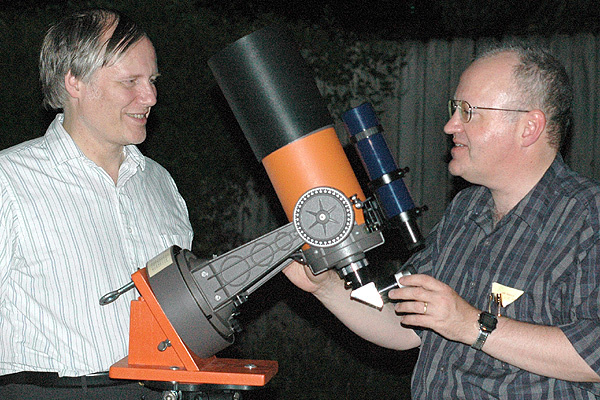
To celebrate the anniversary, we observed with it again, using a contemporary eyepiece
(Celestron "silvertop" Plössl) and star atlas (Norton's, 1966).
The original idea was to have a "retro night" using no technology that was not available
in 1980.
In fact, though, we only got one clear night during Doug's whole visit, so we also set
up the 8-inch LX200.
We viewed as many types of celestial objects as possible: double stars (Albireo, Gamma Delphini,
Theta Serpentis), open clusters (M29, M39, M7), emission nebulae (M8, M17), planetary nebulae
(M57, M27, NGC 6572), globular clusters (M13, M92, M2, M22, M71), a remnant of a captured
galaxy (M54), and a distant galaxy (NGC 7331).
Finally we also used the Nikon D70s for its first astrophoto, a 30-second exposure of Sagittarius
with a 50-mm f/1.8 lens wide open, at ISO 400 with automatic dark frame subtraction turned on.
This picture was taken through a very hazy, murky sky and should not be compared with anything;
it shows only that the D70s can photograph stars.
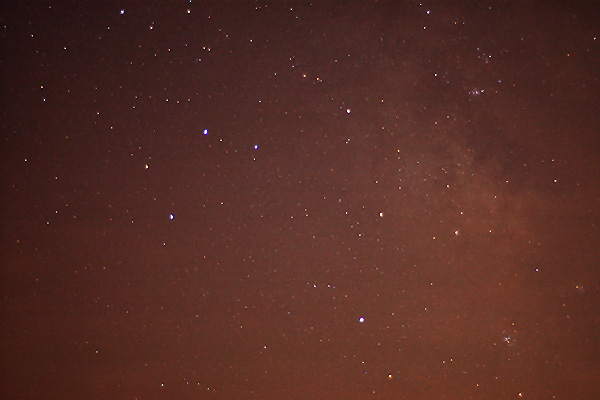
Permanent link to this entry

|
 |
2005
August
1
|
Utility to download HTTP files from the command line
Our old friend
Doug Downing,
who is completing his week-long visit today,
maintains an interesting
web page of economic data which he
retrieves from various sources.
To help him update it automatically, I wrote a
command-line utility to download files by HTTP
given the URL and the file name under which you
want to save them. For example,
gethttp http://www.ai.uga.edu/mc/schedule.txt c:\temp\schedule.txt
will download my schedule onto the file c:\temp\schedule.txt on your
machine.
Doug will use gethttp in batch scripts (.BAT files), of course.
It's a very short .NET application and developing it took only half an hour,
even though I had no prior experience with the .NET Web interface.
You can download the executable
here
or the complete Visual Studio project
here.
To run it, if you haven't already done so,
you'll need to
install .NET Framework
(also available
here).
When using gethttp, be sure not to leave out "http://" at the
beginning of the URL.
Permanent link to this entry

|
 |
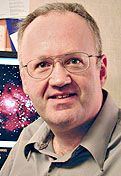

![]()










